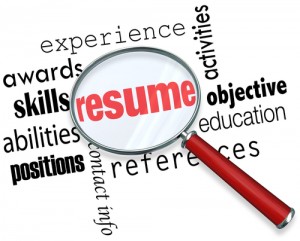Career Advice for Job Seekers
Writing Your Next Resume? Omit This Information

A magnifying glass over the word Resume surrounded by related terms. Photo courtesy of Shutterstock.
While you want to make the right first impression on your resume, you don’t need to share everything about yourself with a potential employer. He or she will likely only glance at it for a number seconds, and if unimpressed, simply toss it aside. In the following post, Michelle Joseph, a talent acquisition expert and CEO of PeopleFoundry, shares tips on creating the best professional resume by avoiding or taking off certain information.
Objective Statement
Long a constant on the resume, the objective statement has run its course. By speaking only in generalities and telling the employer what you want, this sentence does not lend any substance to the resume. If the resume feels naked without it, then interchange it with a sentence specific as to why one will be successful in the position that is being applied for.
Contact Information and References
Personal data and references cannot take up too much space on the resume. Ensure that you have important contact information such as your name, e-mail, and phone number at the top of the page. References on the other hand should be on a separate page and only get sent if specifically asked for in the application or by the employer. If they want references, they will request them; there is no need for “References available upon request.”
High School
There is no room for high school experience on a professional resume. The only time there might be an exception to this rule is if you attended a specific trade high school in the industry. Unless it holds this level of relevance, then it is simply a waste of space.
Specific College / University Information
Providing the name of the college or university that you graduated from along with the degree that was achieved is an important part of any resume. For those who graduated within the last five years, coursework related to the industry you are applying for can be helpful. After that, there is no need for further information, employers do not need your college’s address or phone number. Any low GPA does not lend any benefit and should be omitted as well.
Irrelevant Job Experience
Any job experience that is listed should be relevant to the position that is being applied for. Experience from over a decade ago is no longer pertinent information for an application, as much will have changed since that time. Finally, unless a job was planned to be short term, ie. internship or event planning, then it should be left off the page as well.
Expert Hint: Have a master copy of all past jobs, skills, dates, etc., so when you are applying for a specific industry you can easily compile the relevant data.
Daily Duties
Descriptions of work experience should be an overview of tasks and duties during the duration of time there. Actually including descriptions of what happened on a daily basis is overkill and will turn a hiring employer off to reading that particular resume. Provide them with the database systems that you are proficient in, a range of clients you coordinated with, etc., can showcase your ability to multitask and take on a sufficient workload.
About Michelle Joseph:
Michelle is the Founder and CEO of PeopleFoundry Inc. She is an expert in Human Resources and talent acquisition. Michelle works with Chicago growth companies to build top-tier teams by forming partnerships to find the best people the businesses seek. Michelle has a strong voice in the local tech space, regularly speaking at engagements and presentations at 1871. Click this link to learn more about Michelle in an interview with Bootstrapping America. www.peoplefoundry.com
New Job Postings
Advanced Search